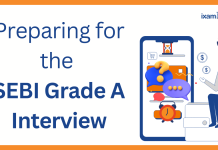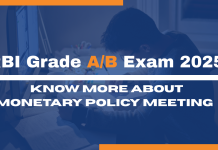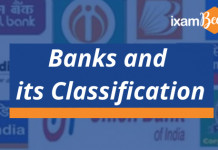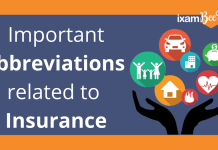Embarking on the journey to secure the esteemed SIDBI Grade A Assistant Manager position promises a fulfilling and empowering career path. However, success on this road requires meticulous preparation and a keen awareness of potential pitfalls. Amidst the plethora of online study resources, navigating cautiously and leveraging the advantage of personalized guidance from seasoned experts is crucial. The Small Industries Development Bank of India offers the coveted SIDBI Grade A position, ensuring a rewarding career within a developmental financial institution. As the recruitment drive for Assistant Managers unfolds in 2023, avoiding common mistakes becomes a pivotal aspect of a well-considered strategy.
In this blog, we aim to guide aspiring candidates for Upcoming Government Exams 2024 by shedding light on the mistakes to avoid during the SIDBI Grade A Group Discussion (GD) – a critical step in the selection process. Considering that the online application window closed on November 28, 2023, and the GD phase is scheduled for December 2023/January 2024, let’s delve into key aspects to ensure success in this significant examination segment. By understanding the nuances of group discussions, steering clear of pitfalls, and adopting effective communication strategies, aspirants can better prepare for the challenges posed by the SIDBI Grade A GD.
Furthermore, candidates must familiarize themselves with the intricacies of the SIDBI Grade A examination pattern, explicitly focusing on the GD component. This involves recognizing the evaluation criteria, understanding the importance of active participation, and avoiding common pitfalls that may negatively impact performance. Delving into these details enables candidates to tailor their approach, increasing the likelihood of success in the SIDBI Grade A GD. Acknowledging that triumph in this phase demands dedication, strategic planning, and an insightful understanding of the potential stumbling blocks to navigate is imperative.
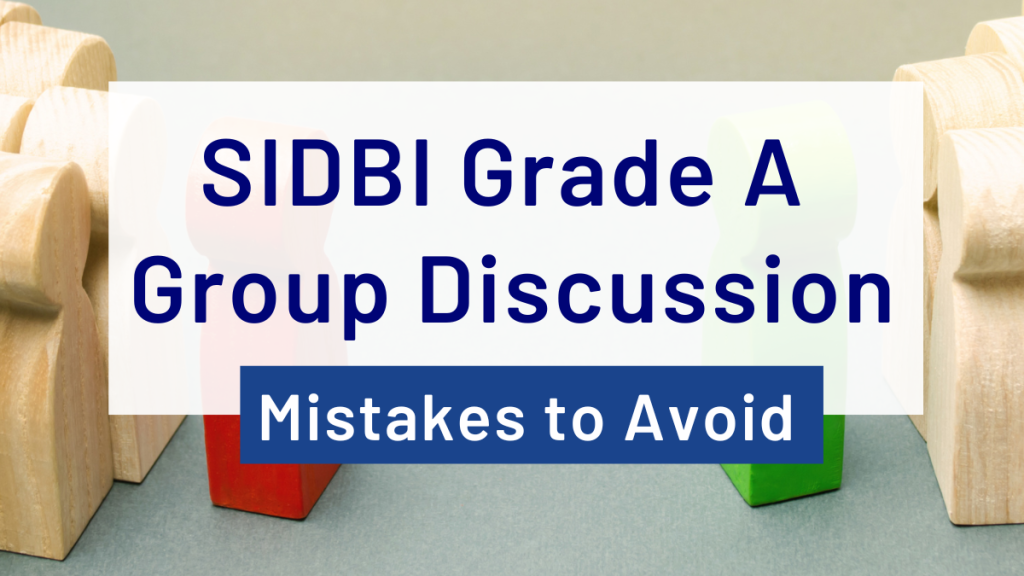
ixamBee’s ‘SIDBI Grade A Group Discussion (GD) and Personal Interview Guidance Course (PI)’ will benefit candidates looking to ace the recruitment process. The first thing candidates need is proactive awareness of the mistakes to avoid. This can significantly enhance their chances of standing out and making a positive impression during this crucial phase of the selection process.
SIDBI Grade A Eligibility Criteria 2023
Comprehending the SIDBI Grade A eligibility criteria is crucial before initiating the exam application process, as failure to meet these requirements can lead to the cancellation of your application—an undesirable setback for any aspiring candidate. The SIDBI Grade A 2023 notification brings notable changes, especially in educational qualifications and work experience. The updated criteria underscore the significance of work experience, introducing a new aspect to the eligibility requirements for those aspiring to secure the SIDBI Grade A Assistant Manager role.
Candidates must familiarize themselves with the specific qualifications outlined in the notification and adapt their preparation strategy accordingly. Notably, the notification permits candidates in their final year to apply, with the provision that they submit the required documents during the interview. Staying informed and navigating these changes seamlessly ensures aspiring candidates are on the right track to becoming a SIDBI Grade A Assistant Manager in 2023. The table below provides comprehensive information about the eligibility requirements for the SIDBI Grade A 2023 Exam.
| Criteria | Eligibility Needed |
| Educational Criteria | Bachelor’s Degree in Law, ORBachelor’s Degree in Engineering ORMaster’s Degree in any discipline ORPh.D. OR CA / CS / CWA / CFA / CMA OR Bachelor’s degree in Law / Bachelors’ Degree in Engineering with a minimum of 60% marks (SC / ST / PwBD applicants – 55%) in aggregate from Universities / Institutions recognized by GoI / UGC / AICTE. |
| Work Experience | 2 years in Scheduled Commercial Banks / All India Financial Institutions in MSME lending (except personal loan, educational loan, Vehicle Loan, Housing Loan, etc.) OR 3 years in systemically important NBFCs in MSME lending / Non-Individual lending / Corporate Lending |
| Age Criteria | Minimum-21 Years / Maximum-30 Years |
| Age Relaxation | Minimum-3 Years / Maximum-15 Years |
SIDBI Grade A Exam Pattern and Syllabus
The revised SIDBI Grade A GD & Interview Syllabus emphasizes evaluating candidates’ personalities, with each component scoring 100 marks. Thorough assessment spans personal, educational, and current affairs domains. A proactive approach to anticipating questions about personal life, aligned with one’s resume, is pivotal for success. Cultivating a daily newspaper reading habit is advised to stay well-informed, enhancing preparedness. ixamBee offers valuable resources for SIDBI Grade A Exam 2023 preparation, supporting candidates comprehensively. Beyond personal readiness, a profound understanding of SIDBI’s objectives, functions, and recent developments is essential. Demonstrating genuine interest and commitment to contribute to the organization’s goals enhances overall preparedness for the Upcoming Government Exams This familiarity ensures a confident and informed performance during the SIDBI Assistant Manager Group Discussion and Interview, providing candidates with a competitive edge in the selection process. Aspirants are encouraged to adopt this holistic approach to maximize their chances of success in the challenging SIDBI Grade A examination.
Skills Judged in the SIDBI Grade A 2023 GD
The SIDBI Grade A 2023 Group Discussion assesses candidates for critical skills, including interpersonal communication and teamwork. Aspirants, especially those exploring the Latest Government Jobs, should spotlight these attributes to stand out in the competitive selection process, aligning with the organization’s expectations for a well-rounded skill set.
- Communication Skills/Public Speaking Skills: Effective communication is paramount in the SIDBI Grade A 2023 Group Discussion. Showcase your ability to articulate thoughts clearly, ensuring peers and evaluators easily understand your ideas. Public speaking prowess distinguishes you as a confident and compelling contributor to the discussion, enhancing your overall impact during this crucial evaluation. Utilize body language and tonal variations to convey conviction and engagement further.
- Negotiation Skills: Demonstrate adept negotiation skills by effectively expressing your viewpoints while maintaining openness to diverse perspectives within the team. Navigating various situations with finesse showcases your ability to collaborate, fostering a constructive environment where conflicting ideas can be reconciled for the team’s benefit. Showcase flexibility and adaptability in negotiating varying opinions.
- Leadership Skills: Seize opportunities to exhibit leadership by taking the initiative and steering the group toward a cohesive solution. A strong leader in the GD context contributes ideas and guides the team towards a unified approach, showcasing your ability to influence and guide your peers effectively. Exhibit your capacity to inspire confidence and encourage active participation from all members.
- Analytical Skill: Highlight your analytical prowess by critically evaluating the information presented in the discussion. Showcase your ability to discern key details, draw connections, and offer insightful observations. This skill set reflects your capacity to process information efficiently and contribute substantively to the group’s understanding of the topic. Illustrate your analytical skills through concise and relevant contributions.
- Problem-solving and Critical Thinking: Prove your problem-solving abilities by addressing challenges within the group discussion context. Demonstrate critical thinking by offering innovative solutions and adapting your approach based on emerging perspectives. This showcases your agility in navigating complex situations and finding practical resolutions. Exhibit creativity in problem-solving to showcase a well-rounded skill set.
- Time Management Skills: Efficiently manage time during the GD, ensuring that discussions progress smoothly toward a resolution within the allotted timeframe. Showcase your ability to balance participation and progression, indicating your awareness of time constraints and commitment to achieving meaningful outcomes within the stipulated period. Emphasize your role in keeping the discussion focused and on track.
- Social Attitude and Confidence: Exude a positive social attitude by actively engaging with team members and respecting diverse opinions. Confidence in expressing your ideas contributes to a positive group dynamic. Displaying social finesse fosters an environment where everyone feels heard, demonstrating your capacity to collaborate effectively and contribute positively to team interactions. Cultivate an approachable demeanor that encourages open communication.
- Active Listening Skills: Demonstrate your ability to actively listen to the contributions of others, acknowledging their perspectives and building upon them. Active listening enhances group dynamics and reflects your respect for team members’ opinions. By incorporating and responding to others’ ideas, you showcase collaboration and contribute to a more inclusive and effective discussion environment.
SIDBI Grade A 2023 Preparation Guidelines
Navigating the competitive landscape of government jobs in India demands strategic acumen and thorough preparation. Aspirants hoping for success should adhere to a set of Dos, or proactive measures, to stand out in the selection process. From cultivating a solid foundation in relevant skills to staying abreast of current affairs, these tips are invaluable guidelines for those pursuing lucrative Government Jobs in India.
- Confidence with Caution: Confidence is critical, but a delicate balance is crucial. Display self-assurance without veering into overconfidence, ensuring you project competence while remaining receptive to others’ ideas. Strive for a poised demeanour that fosters a positive impression, showcasing your belief in your abilities without overshadowing the collaborative nature of the discussion. You should also read newspapers, Beepedia and be aware of SIDBI’s functions to be confident when attending your GD.
- Substance Over Superficiality: Emphasize the importance of substantive contributions. Encourage meaningful dialogue by clarifying superficial talk and focusing on relevant, insightful comments. Prioritize quality over quantity, ensuring each remark contributes meaningfully to the discussion, reinforcing your ability to engage with depth and purpose. In addition to Beepedia, keep abreast of the latest developments in the Union Budget and the Economic Survey so that you can speak substantially, using accurate data during the GD.
- Timing and Patience: Highlight the significance of timing and patience in group discussions. Advocate for active listening and thoughtful responses, emphasizing the importance of waiting for an appropriate moment to speak. Patience underscores your respect for others’ perspectives and enhances the overall dynamics of the discussion.
- Clarity in Communication: Stress the importance of clear and straightforward communication. Effective verbal expression in easy-to-understand English is vital. Encourage participants to articulate their thoughts concisely, avoiding unnecessary jargon and complexity. Clarity in communication enhances comprehension and fosters a more inclusive and accessible discussion environment.
- Volume and Articulation: Promote the virtues of speaking loudly and clearly. Effective communication relies on audible and articulate expression. Encourage participants to project their voices and enunciate words distinctly, ensuring that their contributions are heard and understood. A confident and clear vocal delivery enhances the overall impact of your communication in a group setting.
- Embrace Diverse Perspectives: Highlight the importance of accommodating diverse viewpoints. Encourage participants to appreciate and respect differing opinions, fostering an inclusive and collaborative atmosphere. Embracing diversity enriches the discussion, showcasing your ability to engage with varied perspectives and contributing to a more comprehensive exploration of the topic.
- Elaborate with Examples: Advocate for the power of elaboration through scenarios, examples, and data. Encourage participants to support their points with real-world situations, relevant examples, and statistical data. Elaboration strengthens the substance of your contributions and showcases your analytical and critical thinking skills, adding depth to the discussion.
Mistakes to Avoid During SIDBI Grade A GD
Beginning a journey towards success in government jobs in India demands an understanding of what to do and an awareness of what to avoid. Regarding career aspirations and competitive exams, sidestepping common pitfalls is as essential as mastering the content. This compilation of things not to do serves as a strategic guide, enlightening aspirants on pitfalls to avoid ensuring a smoother and more effective preparation journey. Candidates can use ixambee’s specialized SIDBI Grade A Group Discussion (GD) and Personal Interview Guidance Course (PI) for better confidence in the GD.
- Staying on Topic: Avoid diverting from the topic during the group discussion. Maintain a keen focus on the central theme to ensure a coherent and purposeful conversation. Straying off-topic can dilute the group’s efforts and hinder effective communication. Demonstrating disciplined adherence to the main subject showcases your ability to contribute meaningfully and respect the collective goal of the discussion, fostering a more productive exchange of ideas.
- Respectful Engagement: Never shut the other person down. Cultivate an atmosphere of open dialogue by respectfully acknowledging and considering opposing viewpoints. Dismissing others stifles the collaborative spirit, hindering the group’s ability to explore diverse perspectives and reach well-informed conclusions. Encourage a culture of mutual respect, where every participant feels valued and heard, contributing to a more enriching and inclusive discussion.
- Accuracy in Information: Avoid giving wrong data. Uphold the integrity of the discussion by prioritizing accuracy in the information you present. Misformation can undermine your contributions’ credibility and hinder the group’s decision-making process. By ensuring the accuracy of your data, you strengthen your position as a reliable participant and contribute to the group’s ability to make well-informed and effective decisions.
- Balanced Participation: Invite others to speak without presenting concrete points yourself. Strive for a balanced engagement by offering substantive insights while also encouraging the participation of others. Facilitating an inclusive discussion involves presenting your viewpoints and creating space for diverse perspectives. Act as a catalyst for collaborative thinking, where each participant contributes meaningfully to the overall discourse, promoting a dynamic and cooperative environment.
- Proactive Involvement: Avoid being passive. Actively engage in the discussion, demonstrating your commitment to the topic and showcasing your willingness to contribute meaningfully. Passive involvement can diminish the overall effectiveness of the group, hindering the exploration of ideas and potential solutions. Proactively share your thoughts, insights, and suggestions to foster a vibrant and participatory discussion that maximizes the collective intellect and creativity of the group.
- Maintaining Composure: Avoid slouching and fidgeting. A composed posture signals confidence and attentiveness, enhancing your overall presence during the group discussion. Maintaining a physically poised demeanor communicates a sense of professionalism and focus, contributing to a positive first impression. This non-verbal cue underscores your commitment to the discussion, instilling confidence in your peers and creating an environment conducive to productive collaboration.
- Navigating Group Dynamics: Don’t be deterred by other submissive or aggressive members. Skillfully navigate group dynamics by maintaining assertiveness without overpowering others. Striking a balance between being receptive to diverse opinions and expressing your viewpoints demonstrates adaptability and leadership qualities. Effectively managing varying personalities contributes to a more harmonious and constructive discussion, fostering an atmosphere where every participant feels encouraged to contribute.
- Focused Conversations: Don’t divert from the topic. Stay focused on the central theme to ensure the group discussion remains productive and aligned with its intended purpose. Diligent adherence to the main subject promotes a purposeful exchange of ideas, preventing unnecessary tangents that may compromise the group’s efficiency. By steering conversations back to the core topic, you contribute to a more structured and goal-oriented discussion, maximizing the group’s collective efforts.
- Active Presence: Don’t look distracted. Maintain an active presence by avoiding distractions and demonstrating your full engagement in the discussion. Establishing eye contact, taking notes, and actively listening all contribute to a visible and attentive presence. A distracted demeanor can convey disinterest and impede effective communication. Cultivate an aura of attentiveness to ensure your active participation and enhance the overall quality of the group’s interactions.
- Effective Communication: Don’t raise your voice; improve your argument. Focus on refining your communication style, emphasizing the strength of your arguments rather than resorting to elevated volume. A well-articulated point, supported by sound reasoning and evidence, carries more weight than a louder but less substantiated contribution. By prioritizing the improvement of your arguments, you showcase a commitment to thoughtful and impactful communication, contributing to the group’s collective understanding and decision-making process.
- Strategic Contributions: Don’t be all over the place. Ensure your contributions are strategic and coherent, contributing to the group’s overall understanding without diluting the focus. A scattered approach can hinder the group’s ability to extract meaningful insights and make informed decisions. You contribute to a more effective and purposeful discussion by presenting well-organized and relevant contributions, steering the group towards its objectives.
- Leadership Qualities: Be a leader. Exhibit leadership qualities by guiding the discussion towards constructive outcomes, showcasing your ability to steer the group towards collective goals. Taking the initiative, providing direction, and fostering a collaborative environment are key aspects of effective leadership. By assuming a leadership role, you contribute to a more organized and goal-oriented discussion, inspiring confidence in your peers and facilitating the achievement of common objectives.
- Facilitating Collaboration: Be a facilitator. Encourage collaboration by inviting diverse perspectives and fostering a harmonious environment, demonstrating your capability to facilitate inclusive discussions and optimize group potential. Actively encouraging participation, managing conflicts diplomatically, and promoting an open exchange of ideas contribute to a collaborative atmosphere. As a facilitator, you play a vital role in ensuring every participant feels heard, creating an environment where collective contributions flourish.
Summing Up
Success in the SIDBI Grade A Group Discussion (GD) requires meticulous preparation, industry insight, and polished soft skills. However, candidates must diligently avoid three pivotal errors: entering the GD unprepared, criticizing previous organizations, and committing dishonesty. A comprehensive approach and a deep understanding of SIDBI contribute to enhanced readiness, empowering candidates to adeptly navigate the GD process and attain the prestigious SIDBI Grade A Officer position.
To help you prepare 50% faster for competitive exams, ixamBee provides a free Mock Test Series and all the Current Affairs in English and Current Affairs in Hindi in the BeePedia capsules for GA Preparation. You can also get the latest updates for Bank PO, Bank Clerk, SSC, RBI Grade B, NABARD, and Other Government Jobs.
Also Read
SIDBI Grade A Interview Questions 2023
Mistakes to Avoid During SIDBI Interview





